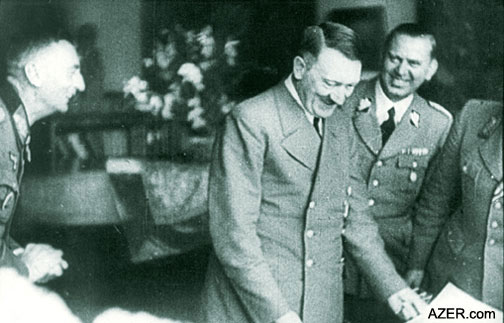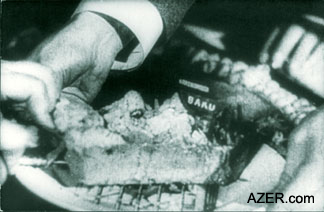Mexico provided around half of German imported oil needs pre 1939,but after that date new surces of supply were needed.
http://www.airpower.maxwell.af.mil/airc ... becker.htm
A cynic could conclude that Hitler was right in attacking Crete in 1941(thus protecting the Ploesti Oilfields),that the southern advance to Kiev rather than Moscow in 1941 at least placed the Wehrmacht closer to the Caucasus and its oil,and that Fall Blau in 1942 was in an economic,strategic sense a proper move.As a highly developed industrial state, Germany was dependent even in peacetime on external sources for an adequate supply of oil. Even though Germany’s 1938 oil consumption of little more than 44 million barrels was considerably less than Great Britain’s 76 million barrels, Russia’s 183 million barrels, and the one billion barrels used by the United States, in wartime Germany’s needs for an adequate supply of liquid fuel would be absolutely essential for successful military operations on the ground and, even more so, in the air.For Germany, it was precisely the outbreak of the war in 1939 and the concurrent termination of overseas imports that most endangered its ability to conduct mobile warfare.
German oil supplies came from three different sources: imports of crude and finished petroleum products from abroad, production by domestic oil fields, and syntheses of petroleum products from coal.
In 1938, of the total consumption of 44 million barrels, imports from overseas accounted for 28 million barrels or roughly 60 percent of the total supply. An additional 3.8 million barrels were imported overland from European sources (2.8 million barrels came from Romania alone), and another 3.8 million barrels were derived from domestic oil production. The remainder of the total, 9 million barrels, were produced synthetically. Although the total overseas imports were even higher in 1939 before the onset of the blockade in September (33 million barrels), this high proportion of overseas imports only indicated how precarious the fuel situation would become should Germany be cut off from them.
At the outbreak of the war, Germany’s stockpiles of fuel consisted of a total of 15 million barrels. The campaigns in Norway, Holland, Belgium, and France added another 5 million barrels in booty, and imports from the Soviet Union accounted for 4 million barrels in 1940 and 1.6 million barrels in the first half of 1941. Yet a High Command study in May of 1941 noted that with monthly military requirements for 7.25 million barrels and imports and home production of only 5.35 million barrels, German stocks would be exhausted by August 1941. The 26 percent shortfall could only be made up with petroleum from Russia. The need to provide the lacking 1.9 million barrels per month and the urgency to gain possession of the Russian oil fields in the Caucasus mountains, together with Ukrainian grain and Donets coal, were thus prime elements in the German decision to invade the Soviet Union in June 1941.
The smallest of the Russian oil fields at Maikop was captured in August 1942, and it was expected that the two remaining fields and refineries in Grozny and Baku also would fall into German hands. Had the German forces been able to capture these fields and hold them, Germany’s petroleum worries would have been over. Prior to the Russian campaign, Maikop produced 19 million barrels annually, Grozny 32 million barrels, and Baku 170 million barrels.
Grozny and Baku, however, were never captured, and only Maikop yielded to German exploitation. As was the case in all areas of Russian production, the retreating forces had done a thorough job of destroying or dismantling the usable installations; consequently, the Germans had to start from scratch. In view of past experience with this type of Russian policy, such destruction was expected, and Field Marshal Hermann Göring’s staff had begun making the necessary preparations in advance. But a shortage of transport that was competing with military requirements, a shortage of drill equipment as well as drillers, and the absence of refining capacity at Maikop created such difficulties that when the German forces were compelled to withdraw from Maikop in January 1943 in order to avoid being cut off after the fall of Stalingrad, Germany had failed to obtain a single drop of Caucasian oil. Nevertheless, the Germans were able to extract about 4.7 million barrels from the Soviet Union, a quantity that they would have received anyway under the provisions of the friendship treaty of 1939.
Even before the Russian prospects had come to naught, Romania had developed into Germany’s chief overland supplier of oil. From 2.8 million barrels in 1938, Romania’s exports to Germany increased to 13 million barrels by 1941, a level that was essentially maintained through 1942 and 1943.7 Although the exports were almost half of Romania’s total production, they were considerably less than the Germans expected. One reason for the shortfall was that the Romanian fields were being depleted. There were other reasons as well why the Romanians failed to increase their shipments. Foremost among these was Germany’s inability to make all of its promised deliveries of coal and other products to Romania. Furthermore, although Romania was allied with Germany, the Romanians wished to husband their country’s most valuable resources. Finally, the air raids on the Ploesti oil fields and refineries in August 1943 destroyed 50 percent of the Romanian refinery capacity. Aerial mining of the Danube River constituted an additional serious transportation impediment. Even so, Romanian deliveries amounted to 7 million barrels in the first half of 1944 and were not halted until additional raids on Ploesti had been flown in the late spring and summer of 1944.
Even with the addition of the Romanian deliveries, overland oil imports after 1939 could not make up for the loss of overseas shipments. In order to become less dependent on outside sources, the Germans undertook a sizable expansion program of their own meager domestic oil pumping. Before the annexation of Austria in 1938, oil fields in Germany were concentrated in northwestern Germany. After 1938, the Austrian oil fields were available also, and the expansion of crude oil output was chiefly effected there. Primarily as a result of this expansion, Germany’s domestic output of crude oil increased from approximately 3.8 million barrels in 1938 to almost 12 million barrels in 1944.10 Yet the production of domestic crude oil never equaled in any way the levels attained by Germany’s other major supplier of oil, the synthetic fuel plants.

